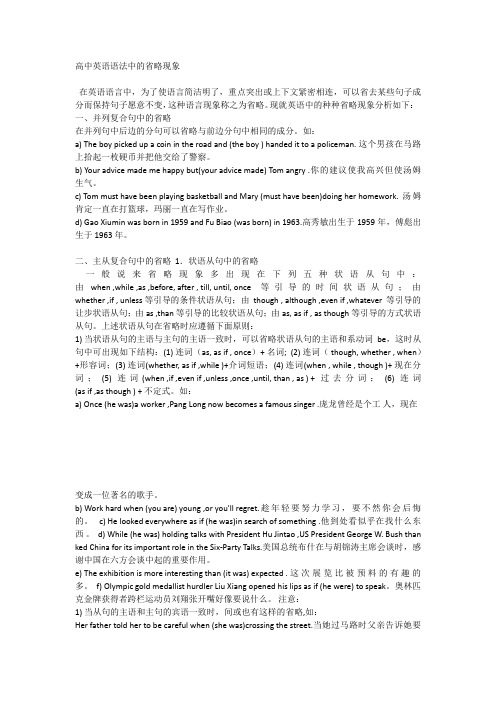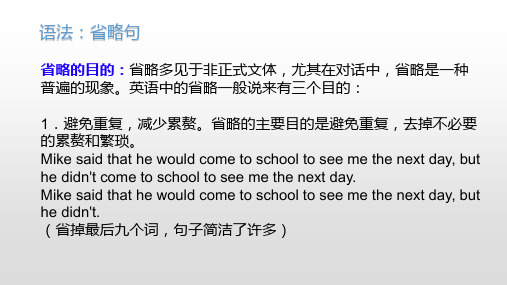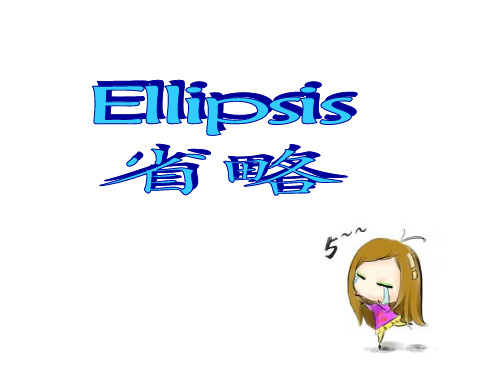英语语法省略
英语语法中的省略现象

高中英语语法中的省略现象在英语语言中,为了使语言简洁明了,重点突出或上下文紧密相连,可以省去某些句子成分而保持句子愿意不变,这种语言现象称之为省略。
现就英语中的种种省略现象分析如下:一、并列复合句中的省略在并列句中后边的分句可以省略与前边分句中相同的成分。
如:a) The boy picked up a coin in the road and (the boy ) handed it to a policeman. 这个男孩在马路上拾起一枚硬币并把他交给了警察。
b) Your advice made me happy but(your advice made) Tom angry .你的建议使我高兴但使汤姆生气。
c) Tom must have been playing basketball and Mary (must have been)doing her homework. 汤姆肯定一直在打篮球,玛丽一直在写作业。
d) Gao Xiumin was born in 1959 and Fu Biao (was born) in 1963.高秀敏出生于1959年,傅彪出生于1963年。
二、主从复合句中的省略 1.状语从句中的省略一般说来省略现象多出现在下列五种状语从句中:由 when ,while ,as ,before, after , till, until, once等引导的时间状语从句;由whether ,if , unless 等引导的条件状语从句;由though , although ,even if ,whatever等引导的让步状语从句;由 as ,than 等引导的比较状语从句;由as, as if , as though 等引导的方式状语从句。
上述状语从句在省略时应遵循下面原则:1) 当状语从句的主语与主句的主语一致时,可以省略状语从句的主语和系动词be,这时从句中可出现如下结构:(1) 连词(as, as if , once)+ 名词; (2) 连词( though, whether , when)+形容词;(3) 连词(whether, as if ,while )+介词短语;(4) 连词(when , while , though )+ 现在分词; (5) 连词(when ,if ,even if ,unless ,once ,until, than , as ) + 过去分词; (6) 连词(as if ,as though ) + 不定式。
高考英语语法知识点归纳总结:省略句

④Child as he is, he knows a lot.
虽然他还是一个孩子,却懂得很多
介词的省略
①both后常跟of短语,其后可以接名词复数形式,也可以接代词宾格复数形式。接复数名词时,介词of可以省略,但接代词宾格时,of不能省略。
②在现在完成时表持续和重复的句型中,一段时间前的介词for可以省略。
这双鞋穿破了,已经穿了很长一段时间了。
③Trees can prevent the earth (from) being washed away.
树能阻止泥土被冲走。
Can you stop him (from) going swimming in the river?
你能阻止他下河洗澡吗?
I have some difficulty (in) answering the question.
约翰一定在踢球,而玛丽一定在做作业。
②His suggestions made John happy, but (his suggestions made) Mary angry.
他的建议使约翰高兴,却使玛丽很生气。
③Old McDonald gave up smoking for a while, but (he) soon returned to his old ways.
有些动词,tell, ask, allow, expect, force, invite, permit, persuade, order, warn, wish, would like,forbid等后跟动词不定式作宾语补足语、主语补足语时,不定式承前省略动词原形,保留动词不定式符号to。
He didn't come, though we had invited him to (come).
英语语法19之省略

三、其他句型中的省略
1.“It be/I am等 + 名词或形容词(+从句)”结构中,重点在后面的内容,因此 前面主语和系动词常省略。 举例:(It is a) pity (that) you missed the film last night.
(It was) Lucy enough for me to have found the right way in the end. 2.主语补语或宾语补语中的to be往往省略。 举例:These instruments are thought (to be) very important.
All our cadres,whatever their rank (may be),are servants of the people. 6.虚拟语气中should或连词if的省略 举例:He ordered that everything (should) be ready before beginning the test.
英语语法省略句

省略句1)不定式在love, mean, want, like, wish, expect, try, intend, plan, refuse, prefer, seem等动词后面2)在happy,glad,eager,ready,willing等形容词后面。
1.---will you join us?--- I should love to(join you).2.I asked him to see the fil m, but he didn’t want to(see the film).3.--- Would you like to go with us?--- Yes, I’m glad to(go with you)4.He doesn’t get up early as he used to. (get up)注意: 如果不定式中含有be, have(助动词), have been, 通常保留be, have(助动词), have been.1.--- Are you a sailor?--- No, but I used to be.2.---He hasn’t finished yet.---well, he ought to have.1. —I'll be away on a business trip. Would you mind looking after my cat?—Not at all, ________ . (NMET 1995)A. I have no timeB. I'd rather notC. I‘d like itD. I'd be happy to2. —Does your brother intend to study German?—Yes, he intends ________ . (NMET 1998上海卷)A. /B. toC. soD. that5.--- He hasn’t gone to the office up to now.--- Well, he _____.A. shouldB. ought toC. ought to goD. ought to have4. —You should have thanked her before you left.—I meant ________ , but when I was leaving I couldn't find her anywhere. (NMET 2000北京春招卷)A. to doB. toC. doingD. doing to替代词so / not用于避免重复前面所说过的内容。
英语语法 省略

语法:省略句
不依赖于上下文的省略。 All aboard! 请上船(= All go aboard.省略谓语) Haven't seen you for ages!(省略主语 I) What about having a game of chess?
语法:省略句
2.并列句中的省略 Sounds like a good idea. (=It sounds like a good idea. 省略主语) Everybody appears well prepared. (= Everybady appears to be well prepared. 省略不定式 to be) 并列句中如果前后分句有相同的部分,常常可以省略掉,以避免重 复。通常被省略的可以是主语、谓语、宾语或其他万分,或句子万 分的一部分。
省略主语和谓语的一部分 Brown speaks French as fluently as English. (as 后省略了 he speaks)省略表语部分 Mrs White is not so young as she looks.(looks 后省略了 young)
语法:省略句
省略主语和谓语的大部分,保留状语 He is working harder than before.(than 后省略了 he worked hard)
D. required
5. Much to his surprise, he invited only twenty friends to the dinner,
but ____A____ came.
A. twice as many as
B. as many as twice
C. twice as many
高中英语语法-省略句

: Unlesshhee is invited, he won’t come.
: Unlesshe is invited, he won’t come. : Whilehhee is doing house work, my father often listens to music. : While he is doing house work, my father often listens to music.
2、省略主谓或主谓语的一部分。如:
(省略主语和谓语)
: What/How (do you think) about a cup of tea ? : Why (do you) not say hello to him ?
3、省略表语。
: –Are you thirsty? – Yes, I am(.thirsty). : His brother isn’t lazy, nor is his sister(.lazy).
※介词的省略※(考点)
1. 一些常和动名词、形容词一起搭配的介词常省 略,而保留其后的 动名词,常见的句型有
spend/waste time (in) doing, lose no time (in) doing; have difficult/trouble (in) doing; be busy (in) doing; stop/prevent sb. (from) doing 等。
: The order that we(sshhoouuldld) stay where we are is very serious and severe.
: It’s very important that students(shshoouuldld) study hard at school.
完整版高中英语语法省略句
3介词but前若有动词do,后面的不定式不带to。-The boy did nothing but pla .-4主语从句中有动词do,后面作表语的不定式的to可带可-不带。-All we can do now i towait.-也●●00●。鲁◆-●●●●意语参带0
【高考链接】-1.20l4福建高考The climate here is quite pleasant,. he-temperature rarely,-reaching 30 Cin summer.-A.if n t-B.if ever-C.if any-D.if so-解析】选B。三-考查状语从句的省略。句意:这儿气 宜人,-如果曾经有过(高温)的话,夏天温度也很少达到30摄氏度。f-ever意为"如果曾经有过或即使有过的 ”,其作用是缓和-语气。if not如果不是这样的话;if any如果有一些的话;ifso-如果是这样的话
3.在对话或并列句中,如果主语、谓语不同,而宾语相同,-则常省去相同的宾语部分。-Tom enjoys d ncing,but Peter hates dancing-0●●09●00套-●色●●意语参●0
4.省略作宾语的不定式短语,只保留0,但如果该宾语是-动词be或完成时态,则须在之后加上be或have。Are you going there?--Yes,I'd like to go there.-注意:在下 词后常省略不定式但要保留to:want,wish,-like,hate,hope,intend,plan, ove,refuse,expect,-want和ike用于从句中时,to常常省略。-●●0●●●●-●●● 培
复合句中的省略-1.复合句中的省略现象常见于从句中,主句中的省略通常出-现在句首。-Hope you wi l have a good journey.-2.有时整个主句都可省略,这种省略通常出现在简短答语-中。Are you going to buy the house?--Unless my wife ob.je ts.-位●●●●培●●0
英语语法 省略句在句子中的作用是什么
英语语法省略句在句子中的作用是什么省略句是指在句子中省略了某个成分,但读者或听者可以根据上下文推断出被省略的内容。
省略句在英语语法中起到简化句子结构、提高语言流畅度和避免重复的作用。
1. 简化句子结构:省略句可以简化句子结构,使句子更加简洁明了。
通过省略一些可推断的成分,可以避免冗余和重复,使句子更简洁、更易理解。
例如:- She can play the piano, and he can too.(她会弹钢琴,他也会。
)- She can play the piano, and he can as well.(她会弹钢琴,他也会。
)2. 提高语言流畅度:省略句可以提高语言的流畅度,使句子更自然、更流畅。
通过省略一些常见的成分,可以避免冗长和啰嗦,使句子更加简洁有力,增加语言的节奏感。
例如:- I like coffee, and she does too.(我喜欢咖啡,她也喜欢。
)- I like coffee, and she likes it as well.(我喜欢咖啡,她也喜欢。
)3. 避免重复:省略句可以避免重复使用相同的词语或短语,使句子更加清晰、更加连贯。
通过省略一些可推断的信息,可以避免重复表达相同的意思,提高句子的表达效果。
例如:- John bought a new car, and Mary bought one too.(约翰买了一辆新车,玛丽也买了一辆。
)- John bought a new car, and Mary bought a new car as well.(约翰买了一辆新车,玛丽也买了一辆。
)虽然省略句可以使句子更加简洁、流畅和连贯,但在使用省略句时需要注意以下几点:1. 上下文的清晰性:省略句需要依赖上下文来推断被省略的内容,因此上下文的清晰性对于理解省略句至关重要。
如果上下文不清晰或含糊不清,可能会导致误解或理解困难。
2. 受限于语境:省略句的使用受限于特定的语境和语言环境。
[英语语法]省略句
省略句定义:为了使语言简洁或避免重复,要省略句中的一个或几个成分,这种语法现象称之为省略。
英语中省略现象较为普遍,对省略的考查已成为高考中的热点。
句子成分的省略,可分为以下几种情况:1.省略主语,主谓语或主谓的一部分2.不定式符号to的省略3.不定式结构中动词的省略4.状语从句中的省略5.定语从句中关系词的省略6.虚拟语气中if和should的省略7.考查not,so,neither,nor的“替代性”省略省略句常见情况具体分析:1,在有and连接的句子中为了避免重复,长省略一些重复的词或者词组:1),省略共同的主语或者宾语。
Mr Smith picked up a coin on the road and (Mr Smith) handed it to a policeman.2),若主语不同,而谓语,助动词或者情态动词相同,则省略后面的助动词或情态动词。
Jack must have been playing football and Mary (must have been ) doing her homework.3), 若主语与谓语动词相同,则省略后面的主谓成分。
His advice made me happy, but (his advice made) Jim angry.4),若主语不同的话,但主要动词及后续部分相同,则省略主要动词及后续部分。
I was born in winter 1998, and Bob (was born ) in 1989.5) 省略重复的介词,连词及后续部分。
He was late because he had overslept and (because he had ) missed the train.2,状语从句的省略1),在when, while, whenever, till, as soon as, if, unless, as if, though 等引导的状语从句中,其实是:包括时间,让步,方式等一些状语从句中,若从句主语和主句主语相同,或者是it时,且从句的主语为be动词时,则从句中的主语和be动词常全部被省略。
高中英语语法精讲——省略句
省略句定义:省略是一种修辞手段,省略的使用是为了避免重复。
同时,不损害句子结构,不会引起歧义。
一.功能词的省略1.冠词的省略1)两个并列名词前面都有冠词时,第二个名词前的冠词常可以被省略。
Can we have a medical examination at home without a doctor or (a) nurse?家里没有医生或护士我们能进行医疗检查吗?注意:有些句子如果省略了第二个冠词,会误认为指同一个人,省略时应注意。
They are the gardener and the gatekeeper.他们一个是花园园丁,一个是门卫。
2)表示头衔、职位,而不是这个职业所具体指的那个人时,常省略冠词。
Mary, head of our team, was determined to give up this game.我们的队长玛丽决定放弃这一局比赛。
2.介词的省略1)yesterday afternoon/evening/morning, Sunday, Saturday等时间名词前的介词常省略。
She started work (on) last Monday.她从上个星期一开始工作。
2)for引导的表示一段时间的名词短语,一般for可以省略。
I stayed in Washington (for) four years.我在华盛顿待了四年。
注意:在句首或在否定句中时,“for+一段时间”的短语中不能省略for.I haven't heard from him for a long time.我很长时间没有收到他的来信了。
For a whole year, I was helping my dad on the farm.一整年我都在农场帮我爸爸。
3)of与age, size, color, height, material, shape等表示大小、长短、颜色、年龄、形状、高度等的名词连用时,常被省略。
- 1、下载文档前请自行甄别文档内容的完整性,平台不提供额外的编辑、内容补充、找答案等附加服务。
- 2、"仅部分预览"的文档,不可在线预览部分如存在完整性等问题,可反馈申请退款(可完整预览的文档不适用该条件!)。
- 3、如文档侵犯您的权益,请联系客服反馈,我们会尽快为您处理(人工客服工作时间:9:00-18:30)。
英语语法省略一,在由and连接的句子中,为避免重复常省略一些重复的词或词组。
1. 省略共同的主语或宾语。
Mr. Smith picked up a coin in the road and (Mr.Smith)handed it to a policeman.2. 若主语不同而谓语助动词,情态动词相同,则省略后面的助动词或情态动词。
Jack must have been playing football and Mary (must have been)doing her homework.3. 若主语与谓语动词相同,则省略后面的主谓成分。
His advice made me happy, but (his advice made) Jim angry.4. 若主语不同,但主要动词及后续部分相同,则省略主要动词及后续部分。
I was born in winter in 1988 and Bob ( was born in winter) in 1989.5. 省略重复的介词,连词及后续部分。
He was late because he had overslept and (because he had) missed the train.二,状语从句的省略。
1. 在when, while, whenever, till, as soon as, if, unless, as if, though, as, whether等引导的状语从句中,若谓语有be, 而主语又跟主句主语相同或是it时,则从句的主语和be常被省略。
As (he was) young, he was a store-keeper. His opinion, whether (it is) right or wrong, would be considered.2. 在as, than, however, whatever, no matter what等引导的从句中常省略某些成分。
Anyone, no matter who (he is), may point out our shortcomings. I can only do it the way as (I was) told to (do it that way).3. 虚拟条件句常省略if, 将were, had, should提前构成部分倒装。
Should there be a flood = (If there should be a flood), what should we do?4. 有些状语从句置于句末,可作句尾省略,有时可省略整个从句。
John will go there if my brother will (go). I would have come yesterday (if I had wanted to).三,定语从句和名词性从句中的省略。
1. 在限定性定语从句中,作宾语用的关系代词whom, which, that可省略;在以the same…as和such as引出的某些定语从句中,也可省略与主句相同部分。
The girl (who\whom\that) the teacher spoke to is Liu Ying. I don't like such books as this (is).2. 定语从句中的'主语+系动词be'可以省略。
The goods (which were) ordered last month haven't arrived yet.3. 在know, think, consider, suppose, find, believe, say, decide等动词后面所接的宾语从句中,连词that可以省略;若带有多个宾语从句,只有第一个that可省略,其余的则不能。
I think (that) it will clear up(转晴)this afternoon. He said (that) the text was very important and that we should learn it by heart.4. 由which, when, where, how和why引导的宾语从句,可全部或部分省略。
He will come back, but he doesn’t know when (he will come back).5. 在与suggest, request, order, advise等词相关的名词性从句中,须用虚拟语气形式'should+动词原形',should可省略。
The officer ordered that his men (should) fire. It is suggested that we (should) go to see the film.四,复合句中特殊的省略现象。
1. 主句省略多用于句首,在答句中,主句或者一些成分可全部省略。
(It is a) Pity that I didn't go to Mary’s birthday party yesterday.2. 省略一个从句或从句的一部分,可用so或not代替。
1) --She may not be free today. --If so (so=she is not free today), we will have to report the manager.2) --Is he feeling better today? --I'm afraid not(not=he isn't feeling better today).五,动词不定式省略,只保留to的场合。
1. 不定式作某些动词的宾语时,常见意愿动词如like, love, care, hope, wish,expect, afford, forget, prefer, refuse, mean, try, oblige(强迫),advice, persuade, agree, want, remember, manage等。
You can do it this way if you care to. --You should have thanked her before you left. --I mean to , but when I was leaving I couldn’t find her anywhere.2. 不定式在句中作某些动词后的宾补或主补时,常见的有ask, tell, advise, force, persuade, wish, allow, permit等。
She wants to come but her parents won't allow to.3. 不定式在句中作某些形容词的状语时,常见形容词如happy, glad, eager, anxious, willing, ready等。
I think she should get a job, but you can't force her to if she's not ready to --I'll be away on a business trip. Could you mind looking after my cat? --Not at all. I'd be happy to.4. 不定式作某些复合谓语时,常见结构如be able to, be going to , have to, ought to, used to等。
He doesn't like fish but he used to. 注意,当省略的内容是作动词用的have或be的任何形式时,to 后面保留原形have或be. He didn't come, but he ought to have. Alice is not what she used to be.六,动词不定式符号to 的省略。
1. 主语部分有to do, 系动词是is或was时,作表语的不定式通常省略to. The only thing you have to do is (to) press the button.2. 作介词but, except, besides的宾语时,前面有实义动词do时,常省略不定式符号to. Tom had nothing to do besides answer betters this morning.3. 当两个或多个不定式并列时,其后的不定式符号可省略,但有对比关系时则不省略。
It is easier to make a plan than to carry it out.4. 在see, watch, notice, hear, listen to, look at, feel, have make, let, leave, observe 等词后作宾语补足语时,省略不定式符号to;Why (not)do结构中不定式不带to. Did you notice her enter the room? Why not join us?七,介词的省略。
1. 一些常和动名词、形容词一起搭配的介词常省略,而保留其后的动名词,常见的句型有spend/waste time(in)doing, lose no time(in)doing, have difficult/trouble (in) doing, be busy (in) doing, stop/prevent sb. (from) doing 等。
The heavy rain prevented him (from) arriving there on time. She lost no time (in) giving the patient first aid.2. 表示时间的介词at, on和in 用在next, last, this, these, yesterday, tomorrow, one, any, every, each, some, all等词之前,一般皆省略,表示一段时间状语之前的for 也可省略。
We go to school every day except Sunday. We have been here (for) three weeks.(否定句中不能省略for).3. 表示行为方式的in在in this way, in the same way, in another way等词组中,经常被省略。
